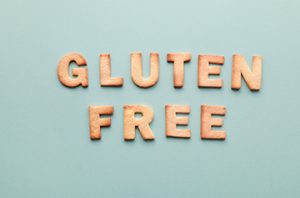 In the grocery store, you see packaging and advertisements touting gluten-free products. It can create an air of danger around gluten, but you don’t need to avoid it. Gluten isn’t necessarily bad for you unless you have a gluten allergy, intolerance, or celiac disease. It’s similar to lactose intolerance. Some people have difficulty digesting it, and others may have an allergy or condition that makes it hard on their body, but for most people, consuming gluten is okay. Gluten is a protein in wheat, rye, barley, triticale, malt, brewer yeast, and wheat starch.
In the grocery store, you see packaging and advertisements touting gluten-free products. It can create an air of danger around gluten, but you don’t need to avoid it. Gluten isn’t necessarily bad for you unless you have a gluten allergy, intolerance, or celiac disease. It’s similar to lactose intolerance. Some people have difficulty digesting it, and others may have an allergy or condition that makes it hard on their body, but for most people, consuming gluten is okay. Gluten is a protein in wheat, rye, barley, triticale, malt, brewer yeast, and wheat starch.
There are some benefits of including gluten in your diet.
There’s no question whether to include it in your diet if you’re gluten-sensitive, intolerant, or have celiac disease. For most people, it’s not necessary and can cause issues. Gluten-free products may substitute less healthy ingredients to get the same texture and flavor as those containing gluten. The recipes are higher in salt, saturated fat, or simple carbohydrates. It can also make it harder to get adequate nutrition. Your diet could lack iron, vitamins D and B, folic acid, and other essential nutrients.
Why is gluten intolerance becoming more common?
In the 1960s, farmers started growing a type of wheat higher in gluten. It’s now about 80% of the wheat grown. Why would farmers switch to that? It was in demand since it made the dough more elastic and stretchable. That results in denser, chewier bread that most people love. The more gluten you introduce into your system, the more potential for gluten intolerance. The body can’t digest the protein properly. With Celiac disease, the body’s reaction is worse. It’s an auto-immune disorder that affects the whole body, not just digestion.
Cutting back on gluten may not be so bad, even if you don’t have problems.
If you cut back on gluten-containing products but don’t replace them with alternatives, you might be healthier. That’s only if the products were highly processed with added sugar. Little Debbie cakes, Ho-Hos, and other high-calorie foods containing few nutrients contain gluten. It’s safe to say that cutting back can improve the health of every person. Don’t replace them with gluten-free junk food, like potato chips.
- When you shop for gluten-free items, you might be surprised at how expensive they are. While your body may not react well to gluten-containing items, your budget won’t fare as well to those gluten-free ones.
- Diabetics need to be more aware of the potential for celiac disease and problems with gluten. Studies show issues with gluten to be one in a hundred in the average population but one in ten in diabetics.
- Gluten is in many items you might not suspect. Soups, soy sauce, pasta, cereal, ketchup, and salad dressing all contain gluten. Some grains are naturally gluten-free. Fruits and vegetables also fall in that category.
- Many gluten-free alternatives are also low in fiber, magnesium, and folic acid. All those things are vital for good health. Fiber helps weight loss and keeps blood sugar levels stable.
For more information, contact us today at Wellness On A Dime Coaching
